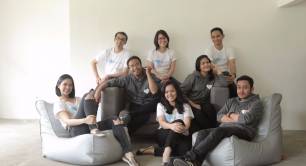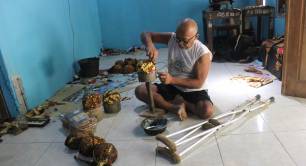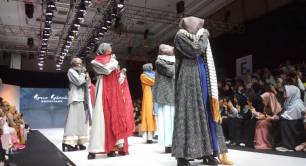Breaking down the disability stigma, one creation at a time
Despite equal opportunity laws, people with disabilities still face discrimination and significant barriers to employment in Indonesia. Over the past year, a project supporting creative entrepreneurs with disabilities from across the country is working to break down barriers – and to raise the bar for other businesses, too. Our Young Storymakers from the UK and Indonesia, Cass Hebron and Astari Sarosa, report.

The negative stigma surrounding people with disabilities in Indonesia is still very much embedded in society. This stigma causes a chain reaction: families hide their children with disabilities and refuse to enroll them in school, resulting in lack of education and proper care, thus many are unable to become financially independent.
Multiple non-governmental organisations, such as Sasana Inklusi & Gerakan Advokasi Difabel (SIGAB) Indonesia and Indonesia Difabel Movement for Equality (PERDIK), note that this stigma continues to paint people with disabilities as a burden or lazy – even though people with disabilities have time and again proven otherwise.
In 2011, Indonesia introduced a law guaranteeing that people with disabilities – who make up almost 10% of the population – have the same rights as other citizens to education, healthcare, and employment.
However, many still struggle to access jobs. According to 2016 data (the most recent available), only around 57% of people aged 15+ with a mild disability were working, while just 20% of those with a severe disability had a job, mostly in agriculture.
Champions of inclusion
That’s where Gerakan Kreabilitas came in – a collaborative movement launched in early 2019 to focus on job opportunities in the creative sector. Since last year it has brought together disabled creative people from all over Indonesia to provide business training and mentoring, and to break down the social and cultural barriers they face.
The initiative is the work of two partners, Ketemu Project and the Arts Development Company (ADC). Ketemu was set up by two artists in 2011, Budi Agung Kuswara from Bali and Samantha Tio from Singapore. Ketemu invites different communities, such as creative practitioners and researchers, to discuss social issues and use creativity and art in social empowerment, aiming to spark ideas and bring a new perspective on social issues. “Our vision is to form an inclusive ecosystem in the creative economy, by giving space for creative actors to support and empower each other,” explains Mayun Dewi, social enterprise manager at Ketemu.
Our vision is to form an inclusive ecosystem in the creative economy, by giving space for creative actors to support and empower each other
ADC, a social enterprise based in Dorset, England, promotes inclusivity, diversity and greater funding and resources in the creative sector in the UK and beyond. It does this through a range of projects aimed at bringing the arts, health, business and environment sectors together.
Collaborating with Ketemu made sense, says ADC project manager Hannah Baker, because among the UK organisation's aims “is to champion the inclusion of marginalised people in society”. Its previous work includes organising creative arts festivals and running leadership programmes for female-led cultural organisations; in the current Covid-19 crisis ADC has been offering free one-to-one support for local creatives.
Above: Mayun Dewi representing KETEMU Project at a DICE marketplace event in 2019 in London (credit Astari Sarosa)
Dewi explains that Ketemu has worked with people with disabilities through other projects and that the team saw incredible potential for them in the creative industry.
“We want to change the negative stigma and we hope through our art activities we can do so,” Dewi tells Pioneers Post. “We want Gerakan Kreabilitas to produce products by people with disabilities that can compete with other products in the creative industry.” Consumers should buy them because they like the products, she adds, “not because they feel sorry for them.”
Gerakan Kreabilitas was designed as a pilot project, as part of efforts to create a supportive and inclusive creative economy in Indonesia, and kicked off with a grant from the British Council’s DICE programme. The hope is to create a positive chain reaction, by using the grant to support five creative enterprises that are improving product development, services, and working environment of people with disabilities in Indonesia. Dewi hopes that the impact will be longer-term, too – that the ecosystem “will develop and be able to support more social creative ventures in Indonesia.”
Practical learning
But first, Gerakan Kreabilitas needed to start with a pilot project. In May 2019, Ketemu invited 30 creatives from around Indonesia to a four-day ‘residential design thinking’ event in Bali.
“We wanted to create experiences with practical work and practical learning, where participants could also help to shape the development process,” says ADC’s Baker.
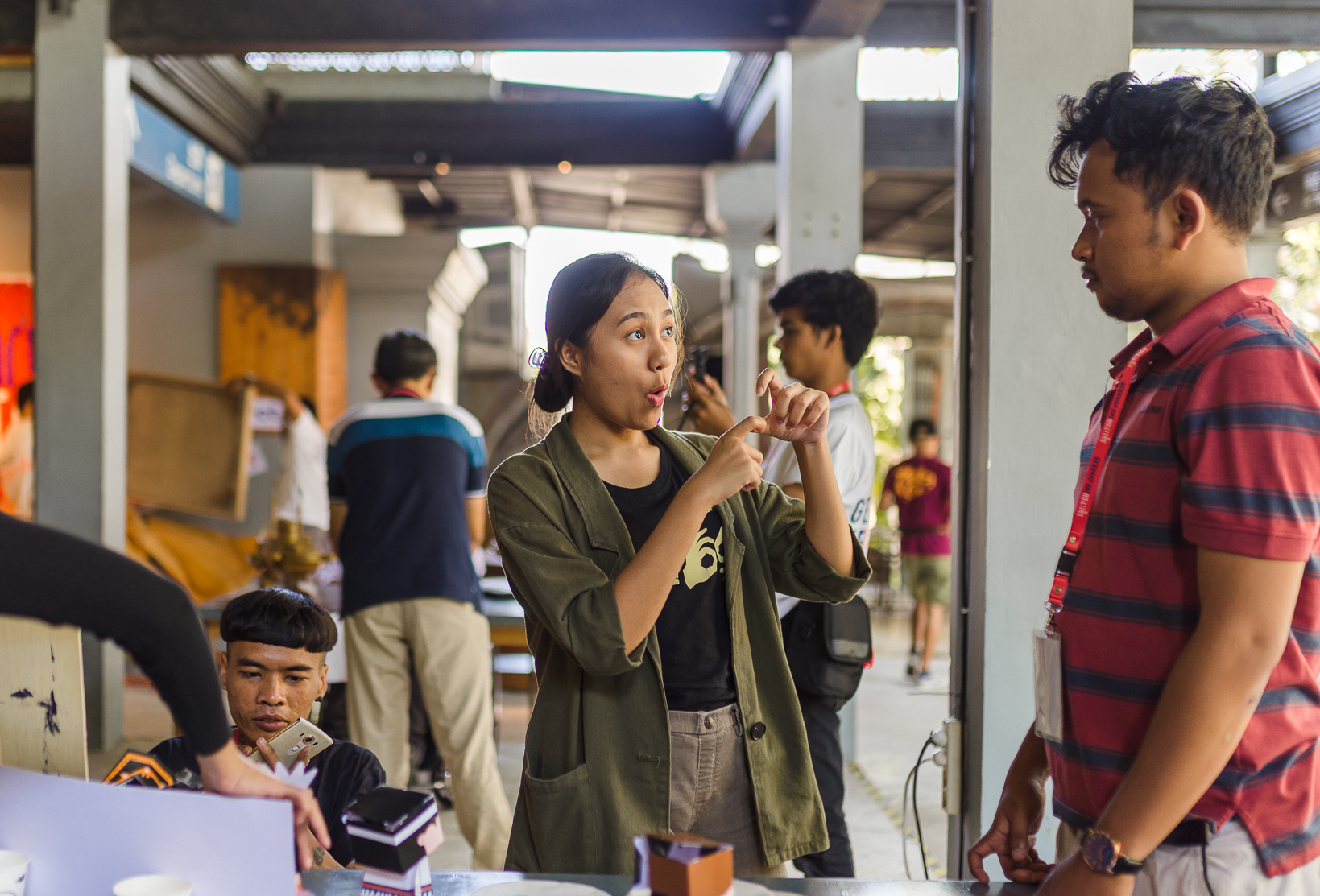
Above: Day three of the residential workshop, when creative entrepreneurs presented their products to the panel of judges (credit: Ketemu Project)
The participants developed products or services in groups of two or three, which they then presented to a panel. The five successful pitches then received intensive support from the Gerakan Kreabilitas partners: staff from ADC, including a resident project designer, travelled to Indonesia to provide training and mentorship on developing the micro-enterprises, and later continued to support the entrepreneurs remotely through online business skills workshops.
The Gerakan Kreabilitas team also visited local businesses around Bali to talk to them about how their company could be more practically accessible to people with disabilities, and talked to local government officials about the barriers and stigma that prevent people with disabilities from accessing jobs.
Sharing experience
International collaboration was key to the success of Gerakan Kreabilitas. Indonesian laws on disability are decades behind those of the UK, so ADC was able to bring experience of working with people with disabilities to the project. For example, ADC helped to identify access needs and provided accessibility recommendations to local businesses where even entering the venue could prove a struggle.
However, without the local knowledge of Ketemu, ADC would have had little impact. Baker, who visited Indonesia for a week at the start of the project, says she was shocked to see the difficulties that disabled people face, many of which would be unheard of in Britain. Practices such as keeping those with disabilities chained up or confined in the family home still exist in Indonesia, as in many other countries.
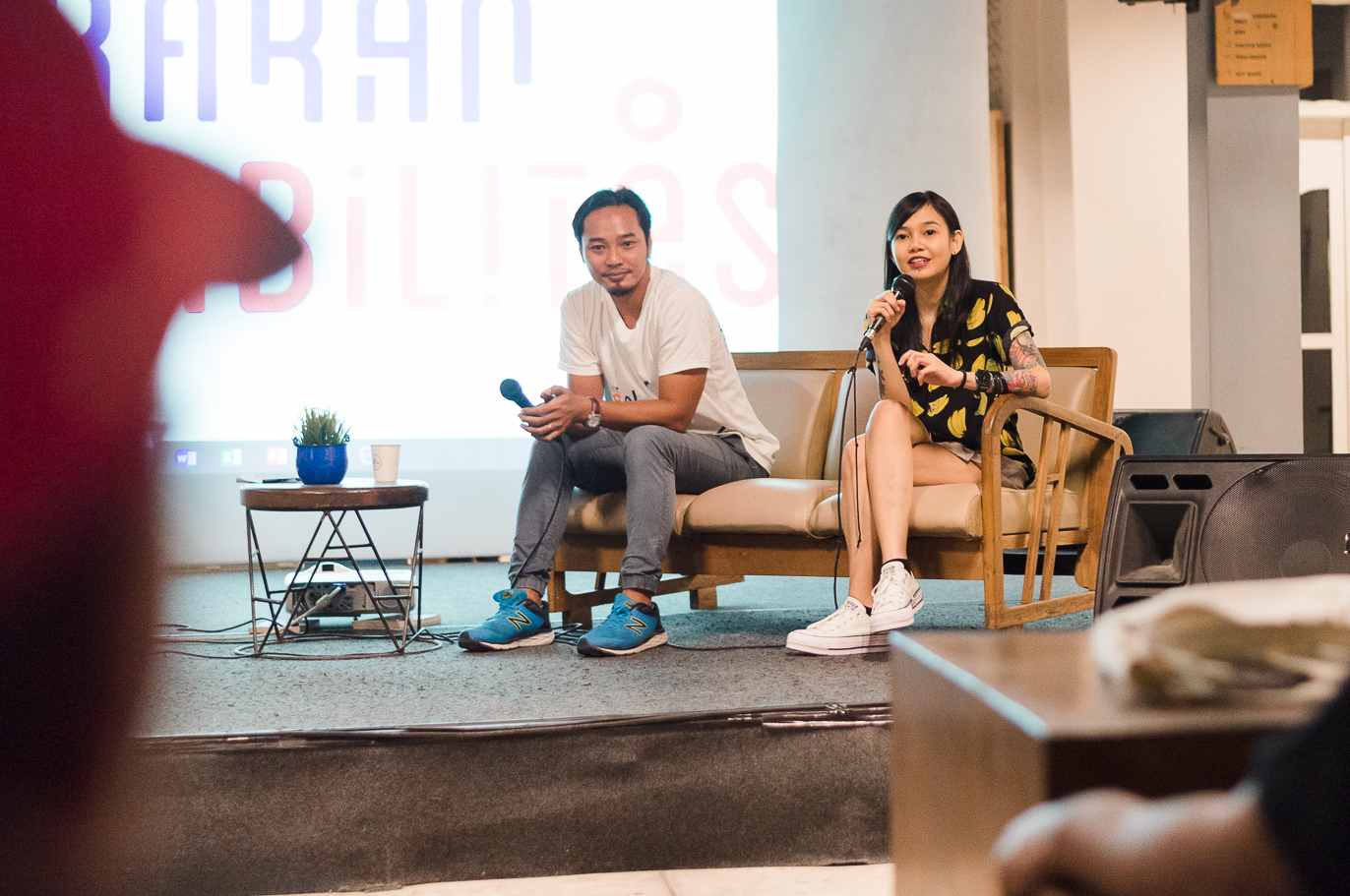
Above: Ketemu Project founder Budi Agung Kuswara, with artist and mental health activist Hana Madness, speaking at a Gerakan Kreabilitas event in June 2019. Ketemu brings people together to discuss social issues and sees creativity and art as a tool for empowerment (credit: Ketemu Project)
“Many of our access preparations had to be adapted on the spot to meet local needs,” says Baker. “It was crucial to have that local understanding and knowledge from Ketemu.”
The collaboration also provided an insight into how social enterprise can adapt to different contexts. Baker emphasises ADC’s desire to keep forming international connections: through the DICE scheme, they’ve become part of a global network with the potential to work around the world.
Keeping up momentum
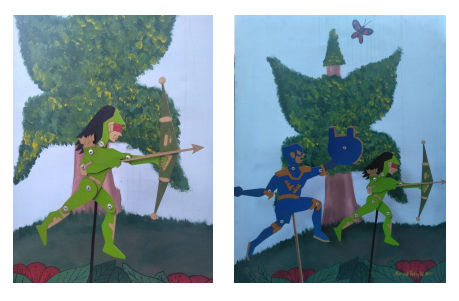 What really stood out was the capacity of entrepreneurs to achieve remarkable things with only a small stimulus. “Provided with a catalyst, people become very resilient and quickly take ownership of their own development,” Baker says.
What really stood out was the capacity of entrepreneurs to achieve remarkable things with only a small stimulus. “Provided with a catalyst, people become very resilient and quickly take ownership of their own development,” Baker says.
The Gerakan Kreabilitas process identified five strong creative enterprises, including KUATILITAS, which develops comic books, interactive merchandise and toys (pictured left) based on superheroes with disabilities, and Lorku, which provides mental wellbeing kits.
Provided with a catalyst, people become very resilient and quickly take ownership
However, the biggest challenge during mentorship and incubation was to follow the planned schedule. “We realised that the five teams are working with different disabilities… Many need more time [to develop their products], and so we have to work on adjusting our timeline,” says Dewi.
There’s been another big interruption to the schedule: Covid-19 has meant that many Gerakan Kreabilitas plans have been postponed. With shops and public spaces forced to close, the products that were supposed to launch in May 2020 have had to wait as well. “We take this situation as time for us to maximise our plan and strategy,” says Dewi, whose team is also encouraging the five creative enterprises to perfect the quality of their products by looking into the smallest details, and to consider branding, storytelling and packaging. “We also invite them to prepare online and social media content for when we launch the products,” she continues.
A positive chain reaction
While Gerakan Kreabilitas has opened up opportunities for people with disabilities, it’s also encouraging other organisations to consider a more inclusive approach. “From our activities in this past year, there are multiple art organisations that contacted us with plans to do similar things and to create a more accessible space in Bali,” says Dewi.
Nor has its work gone unnoticed by the authorities. The head coordinator of Social Welfare Activities (K3S) Denpasar (Bali), Ida Ayu Selly Fajarini Mantra, has shown support by giving encouragement to participants and by sharing information.
When you see a beautiful bag designed by disabled micro-entrepreneurs on the market, that’s a statement that their work has an equal place there
Gerakan Kreabilitas is now designing a guide for collaborating with artists with disabilities. The guide is a summary of Ketemu’s experience and aims “to invite more people to create an inclusive space, whether it is in the workspace, creative process, or even when making an event,” explains Dewi.
So how can Gerakan Kreabilitas measure the success of its project? “Of course, you can make every recommendation imaginable about workplace legislation and resources to improve accessibility, but entrenched stigma is much harder to tackle and its success harder to measure,” says Baker. “But when you see a beautiful bag designed by disabled micro-entrepreneurs on the market, that’s a statement that their work has an equal place there.”
Julia Cass Hebron and Astari Sarosa are DICE Young Storymakers – two of 14 young journalists recruited by Pioneers Post and the British Council from six countries to report on social and creative enterprise.
Header photo: a 'play with clay' event during the Gerakan Kreabilitas residential workshop (credit: Ketemu Project)

